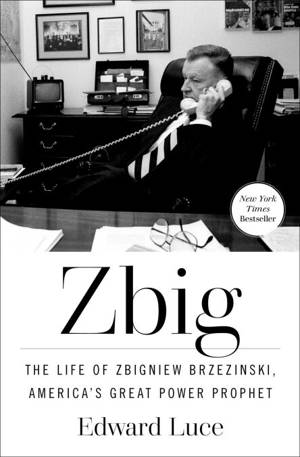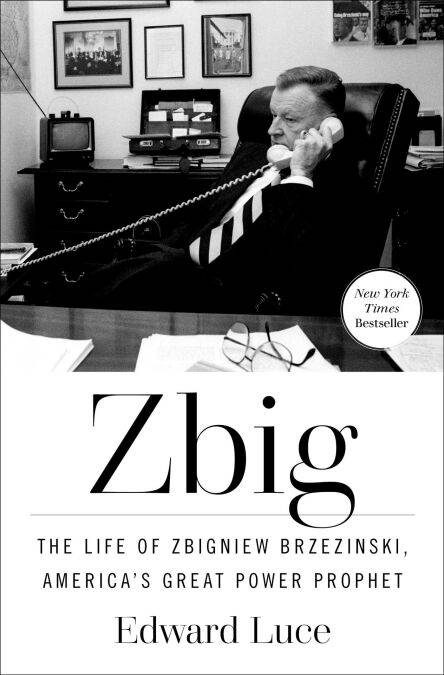
- Retrait gratuit dans votre magasin Club
- 7.000.000 titres dans notre catalogue
- Payer en toute sécurité
- Toujours un magasin près de chez vous
- Retrait gratuit dans votre magasin Club
- 7.000.0000 titres dans notre catalogue
- Payer en toute sécurité
- Toujours un magasin près de chez vous
Zbig EBOOK
The Life of Zbigniew Brzezinski, America's Great Power Prophet
Edward Luce
Ebook | Anglais
19,00 €
+ 19 points
Description
NEW YORK TIMES BESTSELLER
An intimate and masterful biography of Zbigniew Brzezinski—President Carter’s national security advisor and one of America’s leading geopolitical thinkers—from one of the finest columnists and political writers at work today.
Zbigniew Brzezinski was a key architect of the Soviet Union’s demise, which ended the Cold War. A child of Warsaw—the heart of central Europe’s bloodlands—Brzezinski turned his fierce resentment at his homeland’s razing by Nazi Germany and the Red Army into a lifelong quest for liberty. Born the year that Joseph Stalin consolidated power, and dying a few months into Donald Trump’s first presidency, Brzezinski was shaped by and in turn shaped the global power struggles of the twentieth and early twenty-first centuries. As counsel to US presidents from John F. Kennedy to Barack Obama, and chief foreign policy figure of the late 1970s under Jimmy Carter, Brzezinski converted his acclaim as a Sovietologist into Washington power. With Henry Kissinger, his lifelong rival with whom he had a fraught on-off relationship, he personified the new breed of foreign-born scholar who thrived in America’s “Cold War University”—and who ousted Washington’s gentlemanly class of WASPs who had run US foreign policy for so long.
Brzezinski’s impact, aided by his unusual friendship with the Polish-born John Paul II, sprang from his knowledge of Moscow’s “Achilles heel”—the fact that its nationalities, such as the Ukrainians, and satellite states, including Poland, yearned to shake off Moscow’s grip. Neither a hawk nor a dove, Brzezinski was a biting critic of George W. Bush’s Iraq War and an early endorser of Obama. Because he went against the DC grain of joining factions, and was on occasion willing to drop Democrats for Republicans, Brzezinski is something of history’s orphan. His historic role has been greatly underweighted. In the almost cinematic arc of his life can be found the grand narrative of the American century and great power struggle that followed.
An intimate and masterful biography of Zbigniew Brzezinski—President Carter’s national security advisor and one of America’s leading geopolitical thinkers—from one of the finest columnists and political writers at work today.
Zbigniew Brzezinski was a key architect of the Soviet Union’s demise, which ended the Cold War. A child of Warsaw—the heart of central Europe’s bloodlands—Brzezinski turned his fierce resentment at his homeland’s razing by Nazi Germany and the Red Army into a lifelong quest for liberty. Born the year that Joseph Stalin consolidated power, and dying a few months into Donald Trump’s first presidency, Brzezinski was shaped by and in turn shaped the global power struggles of the twentieth and early twenty-first centuries. As counsel to US presidents from John F. Kennedy to Barack Obama, and chief foreign policy figure of the late 1970s under Jimmy Carter, Brzezinski converted his acclaim as a Sovietologist into Washington power. With Henry Kissinger, his lifelong rival with whom he had a fraught on-off relationship, he personified the new breed of foreign-born scholar who thrived in America’s “Cold War University”—and who ousted Washington’s gentlemanly class of WASPs who had run US foreign policy for so long.
Brzezinski’s impact, aided by his unusual friendship with the Polish-born John Paul II, sprang from his knowledge of Moscow’s “Achilles heel”—the fact that its nationalities, such as the Ukrainians, and satellite states, including Poland, yearned to shake off Moscow’s grip. Neither a hawk nor a dove, Brzezinski was a biting critic of George W. Bush’s Iraq War and an early endorser of Obama. Because he went against the DC grain of joining factions, and was on occasion willing to drop Democrats for Republicans, Brzezinski is something of history’s orphan. His historic role has been greatly underweighted. In the almost cinematic arc of his life can be found the grand narrative of the American century and great power struggle that followed.
Spécifications
Parties prenantes
- Auteur(s) :
- Editeur:
Contenu
- Nombre de pages :
- 560
- Langue:
- Anglais
Caractéristiques
- EAN:
- 9781982173661
- Date de parution :
- 12-05-25
- Format:
- Ebook
- Protection digitale:
- Adobe DRM
- Format numérique:
- ePub

Les avis
Nous publions uniquement les avis qui respectent les conditions requises. Consultez nos conditions pour les avis.






